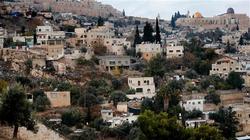 An Israeli court has ruled that a Palestinian family be evicted from their home in the occupied East Jerusalem al-Quds, which is mainly populated by Palestinians, in a case filled by an Israeli settler organization.
An Israeli court has ruled that a Palestinian family be evicted from their home in the occupied East Jerusalem al-Quds, which is mainly populated by Palestinians, in a case filled by an Israeli settler organization. RNA - On Sunday, a Jerusalem magistrates’ court issued the order against the Rajabi family, who has been living in their three-story building since 1975, said the Israeli anti-settlement NGO Peace Now in a report on Monday.
It added that the lawsuit had been lodged by members of the pro-settlement Ateret Cohanim Organization against the family, who pledged to appeal the eviction order.
"There is no other home for me and my family to go to," said Nasser al-Rajabi, father of the family, adding that the youngest member of the family is 18 months old. The building houses 17 Palestinians.
“We reject this decision,” he vowed, stressing that they “are victims of a political game by the Israeli courts and the settler organizations.”
Mohammed Dahla, the family's lawyer, also said that they would file an appeal.
According to Peace Now, the Rajabi family is just one of around 100 Palestinian families threatened by eviction lawsuits filed by Ateret Cohanim, in total putting some 700 people at risk of losing their homes.
The eviction notices were an “attempt to displace a Palestinian community and to replace it with an Israeli one, in the heart of a Palestinian neighborhood in East Jerusalem”, the NGO added.
International bodies and rights groups say Israeli demolitions of Palestinian structures in the occupied West Bank and East Jerusalem al-Quds are an attempt to uproot Palestinians from their native territory and confiscate more land for the expansion of illegal settlements.
About 600,000 Israelis live in over 230 illegal settlements in the West Bank and East Jerusalem al-Quds.
Palestinians view the eastern sector of the occupied city as the capital of their future state.
847/940